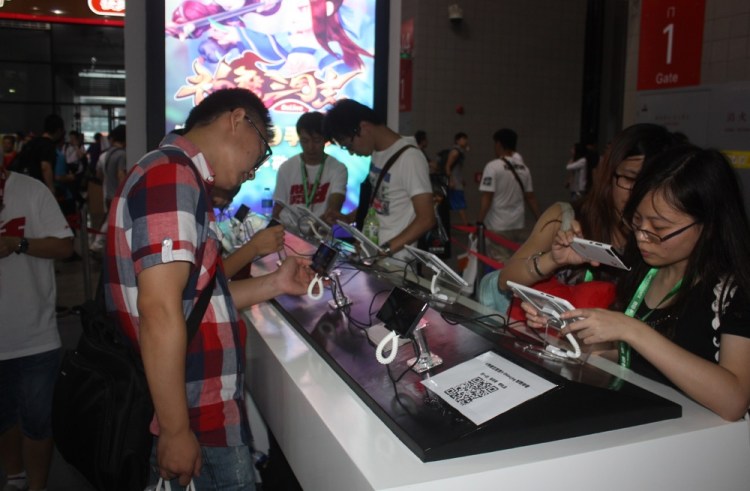Disclosure: The organizers of ChinaJoy paid my way to Shanghai. Our coverage remains objective.
SHANGHAI — It doesn’t get much hotter than this, unless you’re talking about the temperatures this city reaches during the summer. The Chinese mobile-game market has exploded, with revenue expected to grow 93 percent to $2.9 billion in 2014, and that expansion should continue at a compound annual growth rate of 37.6 percent from 2013 to 2018.
Niko Partners, an independent market researcher, estimates that 38 percent of Chinese mobile gamers will spend money in 2014. In a 76-page report, the company analyzed the market and reviewed popular Chinese mobile titles in partnership with San Francisco-based App Annie.
The high rate of paying is surprising, but China is becoming more affluent. Smartphones are becoming ubiquitous, as I saw during my trip to the ChinaJoy gaming expo in Shanghai. Lots of people I met had two smartphones, and they kept chatting on the WeChat mobile-messaging service or talking on the phone — right through a couple of dinners I attended.
Get NewZoo’s free Introduction to the Chinese Game Market or
our own Mobile Games Monetization report on VB Insight
The players pay for premium downloads or, more often, with in-app purchases in free-to-play releases, where people play for free and pay real money for virtual goods. Niko said the percentage of payers will rise every year through 2018. Advertising is not expected to be a big part of overall mobile-title revenues.
By 2018, the mobile-game market in China is expected to hit $7.7 billion in revenue, said Xiaofeng Zeng, senior analyst at Niko, in a translated interview with GamesBeat.
“Mobile games were already popular in 2013, but they’ve become even bigger this year,” Zeng said. “Before, Chinese gamers played shorter time sessions. But now, they play for longer periods. And traditional online game companies like Tencent are now spending a lot more money developing mobile games.”
Casual offerings on Android devices should be the most popular in the market this year. The PC online-game market remains China’s largest sector with $14 billion in revenue expected in 2014. But mobile growth will erode the PC’s dominance.
While China might seem like the land of riches in gaming, Niko warned that its important to understand Chinese players, their preferences, and behavior, as well as the complex distribution environment with more than 190 app stores. If you’re going to launch a game in China, you have to do your homework.
App Annie ranked the top 20 iOS App Store games by downloads and revenue in China for June 2014, and Niko estimated the downloads and revenues of Android games by researching Chinese app stores and markets. Niko surveyed more than 1,000 mobile gamers in large Chinese cities on a couple of occasions, and it spoke with many developers, too.
“With roughly 4,000 mobile games published in China annually, a company needs to understand the true demand and behavior of Chinese gamers in order to ascend to the top of the rankings and generate significant revenue,” said Lisa Cosmas Hanson, managing partner and founder of Niko Partners. “However, with 288 million Chinese mobile gamers in 2014 forecast by Niko to rise to 770 million by 2018, a savvy mobile-game developer can be profitable with even a small amount of spending on its game if it gets into the hands of enough smartphone owners.”
Those figures mean, of course, that the number of Chinese mobile players is almost as big as the population of the U.S., and in the next five years, the number of gamers will be several times bigger.
As for the launch of the Xbox One, some Chinese hardcore gamers are excited about its pending Sept. 23 release in China. Sony is also expected to launch the PlayStation 4 there this year. Microsoft has created a joint venture with BesTV to assemble the Xbox One consoles in China. Chinese authorities are lifting a 14-year ban on game console sales in its country.
Zeng noted that the consoles have been sold in China for a long time in a black market, so a demand exists for the systems. But how much people will pay is an open question, as pirating has been popular.
Zeng said that the initial price of $600 is expensive for Chinese gamers, as it is $200 more than the $400 (without Kinect) cost that Americans pay. He said the prices for the games ($60 in the U.S.) will vary, as the offerings will include free-to-play online releases, digitally distributed indie titles, and full-packaged retail options.
Zeng thinks the initial allocation of Xbox One consoles will be relatively small at the Chinese launch. Microsoft said it has 25 developers working on 70 games. Eight ID@Xbox indie titles are in the works for the Xbox One. Perfect World, the free-to-play-game studio, is working on three Chinese Xbox One titles, including Neverwinter. One challenge Microsoft faces is in getting approval to sell games in China, given the government’s censorship practice.
As for the global market, Zeng isn’t sure how the Chinese will do in competition against Western gaming companies. The West is known for its creativity in mechanics while China, as represented by giants such as Tencent, is known for its financial power. But financial power isn’t everything, as successful indie developers are proving.
In PC online experiences, for instance, the West has a strong presence in the market with titles like League of Legends and World of Warcraft. But in mobile offerings, Chinese-made titles are dominant in China, Zeng said. But few Chinese games have large audiences outside of China, he said.
“It will be hard for the Chinese to succeed worldwide,” Zeng said. “Tencent is an exception.”
VentureBeat's mission is to be a digital town square for technical decision-makers to gain knowledge about transformative enterprise technology and transact. Learn More



